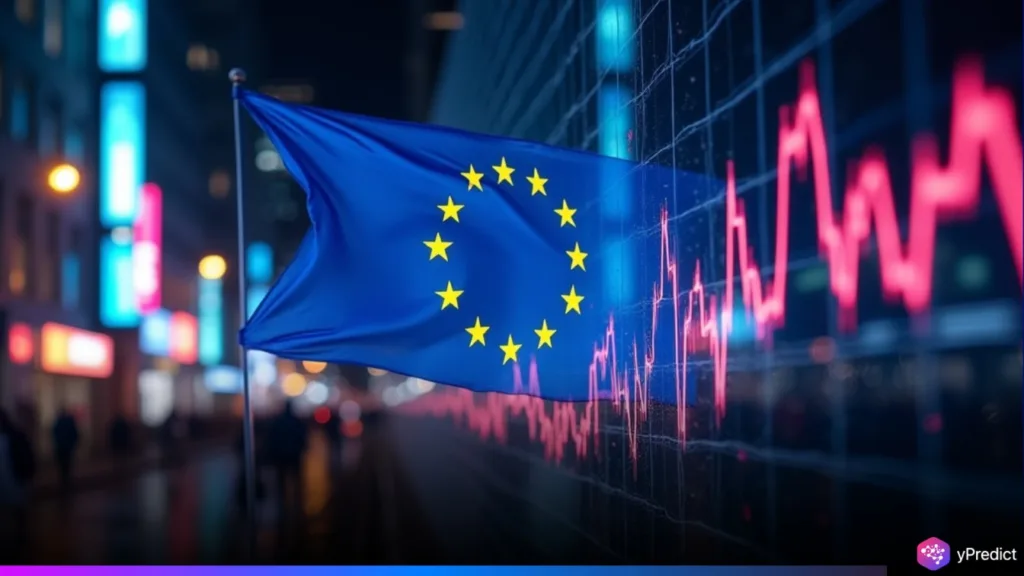
European stocks gain on Friday as investor anxiety eased after the U.S. signaled a delay in potential military action in the Middle East. This pause offered a window for diplomacy, reducing the risk premium that had pressured markets earlier. With oil prices retreating and volatility subsiding, risk appetite strengthened, especially in banking and travel sectors. While the relief rally reflected renewed optimism, investors remain watchful of broader challenges, including central bank moves and unresolved trade tensions between the EU and the U.S.
U.S. Delay in Middle East Action Helps Risk-On Mood
Reuters reported that European equities rebounded modestly on Friday, snapping a three-day losing streak, as signs of a pause in U.S. military decision-making regarding the Middle East helped calm investor nerves. The STOXX 600 index rose 0.6% to 538.85 points in early trading, although it remains on course for a second weekly decline. Key indices also gained, with Germany’s DAX up 0.8% and the FTSE 100 in the UK rising 0.4%.
Investors welcomed indications from the White House that a decision on potential U.S. military action in the region would be delayed by up to two weeks. This development appeared to open the door for renewed diplomatic efforts, with European leaders pushing Iran to return to negotiations amid ongoing tensions between Tehran and Israel. Ipek Ozkardeskaya, senior market analyst at Swissquote Bank, said that,
The investors are taking a little bit more risk on their shoulders… it is perhaps because the U.S. is now giving itself two weeks and maybe some diplomatic opening window there to resolve the situation in Iran.
Traders responded to what they called a “strategic cooldown,” trimming bets on safe-haven assets like gold and bonds, while returning to equities, particularly in cyclical sectors.
Geopolitical Relief Tempers Dollar, Oil Retreats
In currency markets, the euro regained ground above $1.15 as traders scaled back dollar holdings amid easing geopolitical risks. Analysts at ING cautioned that Middle East volatility could limit further gains. The dollar weakened as safe-haven demand eased, while sterling softened following weaker-than-expected U.K. retail sales data that revived concerns over the British economy.
Brent crude prices fell back toward $75 per barrel after peaking near $79, as fears of immediate escalation in the Middle East faded. XTB noted that while oil retains a geopolitical premium, that support is waning. European natural gas prices also declined as concerns over U.S. intervention eased. According to DNB, reduced Norwegian flows and increased spot LNG demand continue to influence gas market dynamics.
Banks, Travel Soar While Energy Slips
Banks led Friday’s advance, climbing 1.3% as investors embraced cyclical stocks amid hopes of steady interest rates and easing geopolitical tensions. Travel and leisure shares also gained 1.3%, with TUI soaring 4.8% after receiving an upgrade from Barclays.
In contrast, the energy sector slipped 0.3%, though it remains on track for a weekly gain, supported by earlier strength in oil prices. The broader risk-on mood was fueled by stabilizing inflation and optimism around de-escalation efforts in the Middle East.
Individual stock highlights included a nearly 7% drop in Berkeley Group, after the homebuilder appointed its finance head as CEO and reported profits that were marginally ahead of forecasts. In contrast, Eutelsat jumped more than 19% after the French government announced it would take a controlling stake through a €1.35 billion capital increase.
Conclusion
Despite the fact that European Stocks gained on Friday, caution lingers as geopolitical tensions persist and the EU’s early July trade deadline with the U.S. approaches, raising tariff risks on key sectors. Analysts warn that any escalation in the Middle East could swiftly unsettle markets, with hopes pinned on diplomacy. The European Central Bank is monitoring the situation, as softer oil prices may help ease inflation. Meanwhile, investors digest recent central bank actions, with Switzerland cutting rates to 0% and others holding steady, reflecting a cautious global stance.







